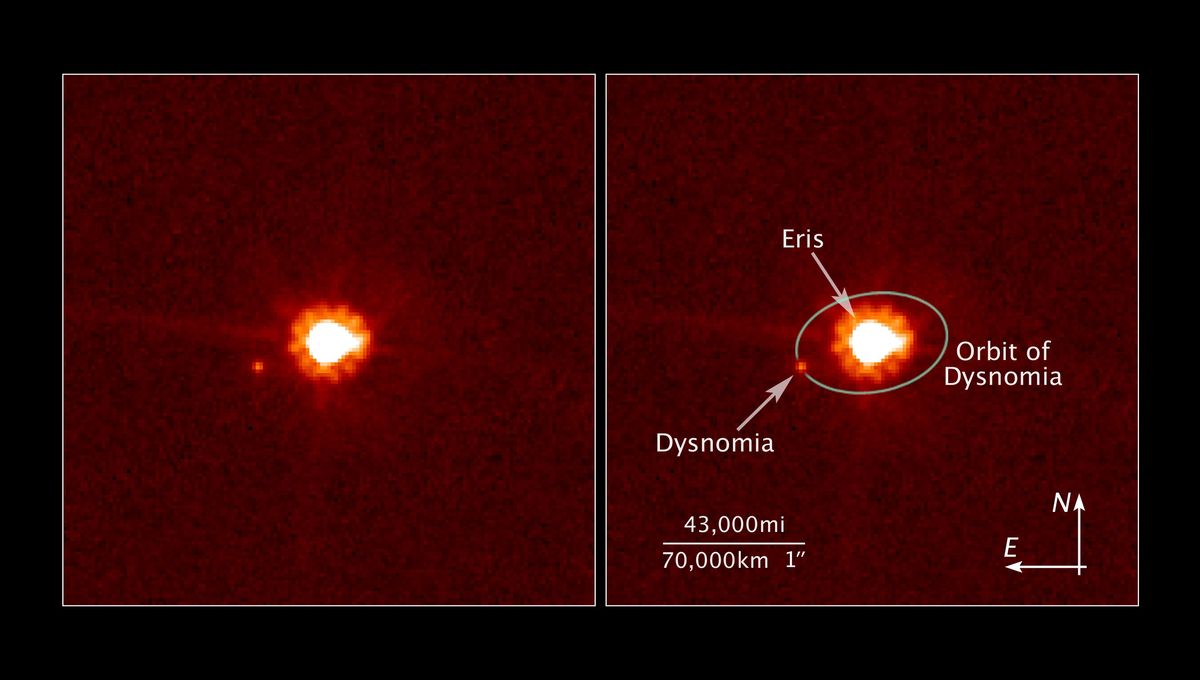
January 5, 2005, is an astronomical anniversary that is not really marked but should be. It saw the discovery of dwarf planet Eris and how those very observations led to a new way to describe the Solar System and heralded the eventual change of Pluto’s planetary status.
On that fateful January day, the team of Mike Brown, Chad Trujillo, and David Rabinowitz discovered Eris. The team had discovered two objects in the years before – Sedna and Quaoar – cold, distant worlds, far beyond the orbit of Neptune. At the time, some people speculated on whether they should be included in the canonical list of planets, but being smaller than Pluto, they were easy to dismiss as something else.
Not Eris. Named after the Goddess of strife and discord, Eris was estimated, at the time, to be larger than Pluto. That was the Kill Bill siren announcing the end of the Solar System’s nine-planet view as it had been for 70 years. No longer would we say My Very Easy Method Just Speeds Up Naming Planets – there could not possibly be nine planets anymore.
Alongside, Sedna, Quaoar, and Eris, there was also the discovery of Makemake and Haumea, which called for a better way to classify planets. There were multiple proposals on how to change it, though, in the end, the definition created a new class of dwarf planets and made a lot of people angry.
Still, kids in school now learn that the Solar System is not just the eight planets but also at least five dwarf planets, hundreds of moons, millions of asteroids and comets, and a lot of other objects we are yet to find.
Eris is more massive than Pluto but has a smaller volume. It has only one known Moon, called Dysnomia, and it orbits the Sun in just over 559 years. At its closest approach, Eris is 5.7 billion kilometers (3.5 billion miles) from the Sun, about 38.3 times further away than the Earth is from the Sun. Its next closest approach is going to happen around December 2257.
Last summer, a new proposal was put forward at the International Astronomical Union General Assembly to consider a new definition of a planet, based on more clear, measurable terms. The current definition has several limitations and a pretty glaring one is that it doesn’t include the over 5,000 confirmed exoplanets that we have discovered in the universe.
The scientists that proposed it hope that the new definition will be discussed at the next General Assembly in Rome in 2027. It requires that a planet orbits a star or a brown dwarf – a moon cannot be a planet – and that it has a mass higher than 1023 kilograms (2.2 x 1023 pounds). No prize for guessing that Pluto and Eris are too light to pass that threshold.
Eris has the most apt name ever given to a celestial body. No matter the side of the planetary debate you are on, nobody has been happy about the definition of the planet since this world was discovered. So, happy discovery day Eris, and All Hail Discordia!
Source Link: 20 Years Ago This Week, The Planetary Downfall Of Pluto Began!